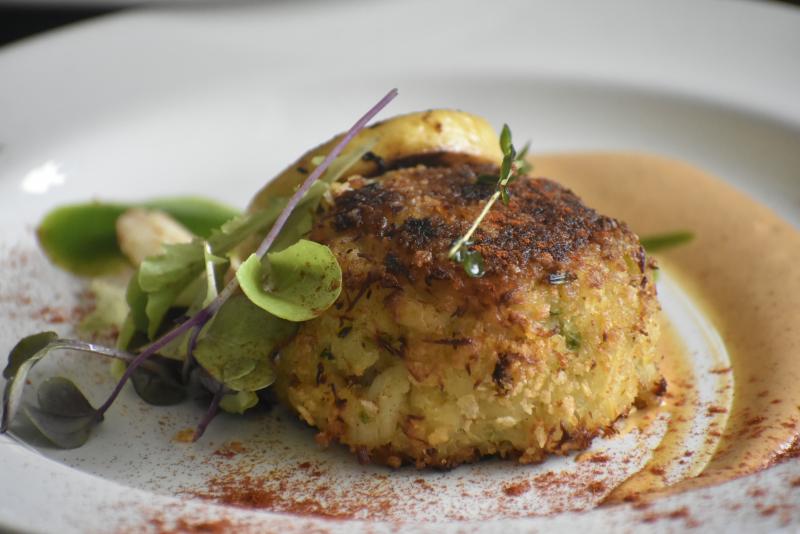
STORY CITY, Iowa (AP) — A new business has taken up residence at the old factory outlet mall in Story City, and its mission may surprise you. Midland Co. is a seafood company using sustainable, environmentally friendly methods to raise shrimp for Midwestern customers.
Yes, shrimp.
“People are certainly interested when you tell them you’re raising shrimp in an old mall in the middle of Iowa,” Jackson Kimle, founder and president of Midland, told the Ames Tribune. “Rather than buying Wrangler jeans or something like that, you’re buying shrimp.”
He expects the company’s first harvest will take place late this fall or early this winter with a yield of about 500 pounds of shrimp. They’ll be big shrimp, so to speak, with a count of between 15 and 20 per pound.
“We’re looking at a small first harvest,” Kimle said. “But eventually we’ll be building to 1,000 pounds a month. And we’ll be building out the facility so we’re producing about 80,000 pounds a year.”
Midland Co. is occupying 20,000 square feet of the former mall, located at 324 Factory Outlet Drive, which is about a quarter of the building. But he doesn’t want to limit shrimp production to just his Story City facility.
He also wants to create possibilities for Iowa farmers elsewhere in the state.
“Our vision is to take something that’s worked quite well for family farms in the poultry and swine space here in Iowa,” said Kimle, an Ames resident who attended Gilbert High School and earned a bachelor’s degree in agricultural business from Iowa State.
He wants to give farmers an opportunity to diversify their operations and have long-term contracts to raise shrimp.
“Potentially, it will help bring kids back home to the farm,” he said. “We see a lot of opportunity for that, and the Midwestern market for shrimp is a lot bigger than this facility that we’re building here can accommodate.”
Accurate Development, the company that was instrumental in the renovation of the former mall, is a main partner with Kimle at Midland Co. Aside from raising shrimp at the Story City location, the site will also serve as a model facility for farmers interested in contracting as growers.
Kimle sources his shrimp from hatcheries in Florida and Texas. They arrive in Story City when they’re about 12 days old and “tiny, tiny,” he said.
Shrimp are fed a pelleted diet and are raised until they’re the proper size. Then they’re sold fresh, never frozen, to restaurants and consumers.
“We’re excited to be able to partner with folks all throughout the state and bring them an opportunity to diversify their operations and hopefully have good returns on that investment,” Kimle said.
The Pacific white shrimp Midland is raising was chosen for two main characteristics.
“It has a sweet, kind of lobsteresque flavor,” Kimle said. “And it’s quite tender. Everyone’s had seafood that is soggy, but this is nice because it’s firm but tender.”
Iowa State professor Joseph Morris, who is also director of the North Central Regional Aquaculture Center, said quality will be an important factor for the success of an aquaculture business like Midland.
“You can buy individually quick-frozen shrimp from the grocery store, but there is a significant quality difference between fresh shrimp and frozen shrimp,” Morris said. “There is a substantial difference in flavor between the two, and some people who taste the difference will be willing to pay the difference in price.”
In August of 2018, Kimle started developing the concept of a sustainable fish production system that could be established in the Midwest, using algae as a novel treatment method for the wastewater.
Kimle calls it “algae-based RAS,” which stands for recirculating aquaculture systems.
“Most people use bacteria to treat wastewater when raising fish,” he said. “But what we see is that algae captures all those nutrients in the cell biomass and captures carbon at the same time.
“So it really provides an opportunity to have zero discharge systems, where you’re sending no nitrogen or phosphorus downstream.”
The algae, full of nitrogen, phosphorus and carbon, can then be collected and used on Iowa’s farm fields, he said.
There’s a waitlist of customers for Midland’s first commercial shrimp harvest, which will cost $18 per pound, and Kimle predicts his customer base will grow as more shrimp are raised in future harvests.
“Americans and Iowans consume a lot of shrimp,” Kimle said, “about four pounds per capita (per year), which is the most of any seafood.”
Matthew Eddy, director of agriculture education for the Iowa Department of Education, said there’s a lot of opportunity for the shrimp industry in the Midwest.
“Somewhere in the neighborhood of 90% of our shrimp is imported from outside the United States,” he said. “So the ability to grow it here is awesome and so is the ability to have a fresh protein supply. Fish are exceedingly efficient feed converters, so there’s a lot of potential there to convert energy into a high-protein meat source.”
Eddy, who also serves as the state’s FFA advisor and is a former ag teacher at Southeast Polk, said that students tend to show high interest in learning about aquaculture.
“It’s really a growing industry,” Eddy said. “To get kids to move back to the farm, you need diversification.”
The Link LonkOctober 10, 2020 at 12:06PM
https://ift.tt/3jIrA2t
Company raises shrimp 'in an old mall in the middle of Iowa' - San Francisco Chronicle
https://ift.tt/3eNRKhS
shrimp

No comments:
Post a Comment